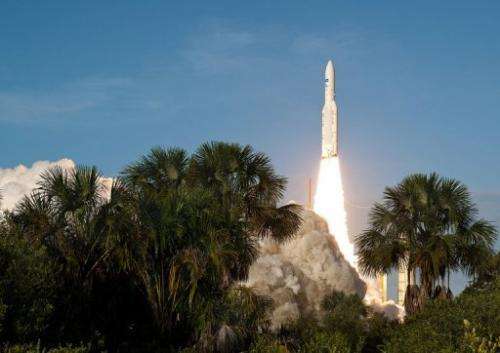An Ariane-5 rocket blasts off in August, from the European space centre of Kourou, French Guiana. France and Germany have overcome differences on building a successor to the Ariane 5 rocket, says French Science Minister Genevieve Fioraso
France and Germany have overcome differences on building a successor to the Ariane 5 rocket, French Science Minister Genevieve Fioraso said at a European space meeting here Wednesday.
A German-backed plan for an Ariane 5 ME will go ahead, with a first flight scheduled for 2017, and as much of its technology as possible will be used in a future Ariane 6, a launcher promoted by France, whose maiden mission would be in 2021-2022, she said.
"We have established a joint document with our German partners, which naturally is extended to our other partners in Ariane," she told journalists at a budget meeting of the European Space Agency (ESA).
The two-day talks, which began on Tuesday, had been overshadowed by discord over a replacement for the ageing but reliable Ariane 5.
The new rocket should provide more flexible launch options for the swiftly-changing satellite market and wean itself off the 120 million euros ($152 million) a year that the Ariane 5 needs from ESA's budget each year.
France had been pushing for a smaller, sleeker Ariane 6, which would require investment of about four billion euros ($6.45 billion).
But industrialists feared this timescale was way too long and would give the advantage to nimble rivals in commercial satellite launches.
They preferred a German-backed option, an Ariane 5 ME (for "Midlife Evolution"), which would be ready by 2017 at a putative cost of two billion euros ($2.5 billion).
ESA ministers will meet again in 2014 to assess progress, Fioraso said.
(c) 2012 AFP






















